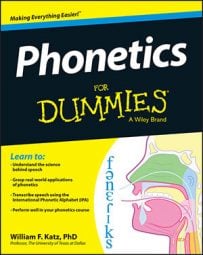Phoneticians use the International Phonetic Alphabet (IPA) to distinguish sound substitutions (one speech sound switched for another) from distortion (slurring or mistiming) errors. This information is helpful to pinpoint the level at which a patient is making speech errors. The following terms can assist you in working with individuals with speech and language problems:
Aphasia: A language disorder in adults resulting from brain injury or disease in which speaking and listening may be affected. Broca’s aphasia and Wernicke’s aphasia are two common types.
Apraxia of Speech (AOS): Also known as verbal apraxia, a condition following brain injury or disease when adults have effortful, dysfluent speech marked by many speech errors. Generally considered a problem with planning and executing speech motor actions (such as putting the lips together and getting the vocal folds ready to make the voiced bilabial stop, /b/).
Dysarthria: A group of speech disorders resulting from a disturbance in neuromotor control, resulting in distortion. Affects the clarity of speech and effectiveness of spoken communication.
ExtIPA: An extended set of IPA symbols designed for disordered speech. Some symbols, especially diacritics, can also be used for the speech of healthy talkers.
Phonemic misperception: A listening problem that occurs when an individual with a communication disorder tries to say a certain speech target but instead makes an improperly timed or poorly coordinated production. As a result, you (the listener) don’t know into which perceptual sound category the production should fall.
Sound implementation error: Also known as a phonetic error. It’s the difficulty outputting a selected speech sound. Most frequently associated with Broca’s aphasia and AOS.
Sound selection error: Also known as a phonemic error. It’s the difficulty selecting the correct speech sound for speech output. Associated with fluent-type (Wernicke’s) aphasia.
VoQS: A set of voice quality symbols useful for describing world languages and also speech pathology conditions, including electrolarynx speech, harsh voice, and so forth.

